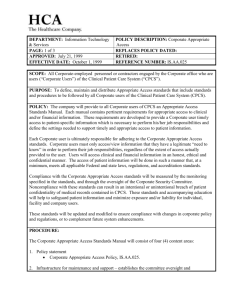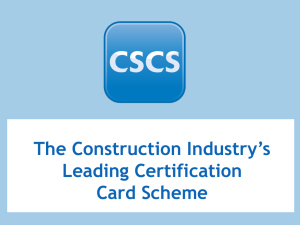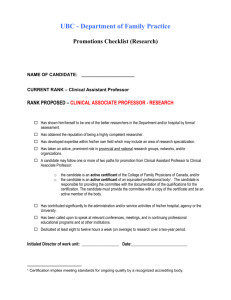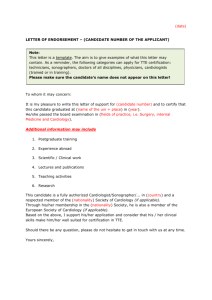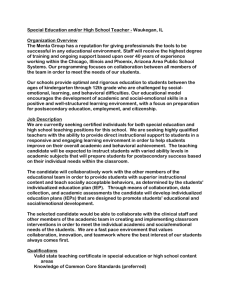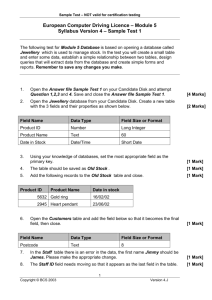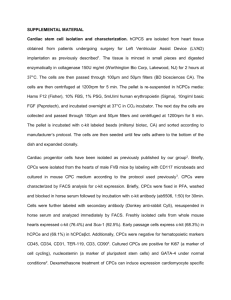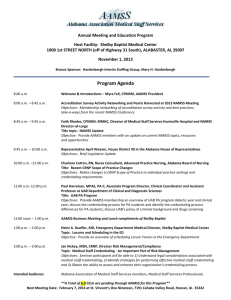NAMSS Leadership Conference 2012
advertisement
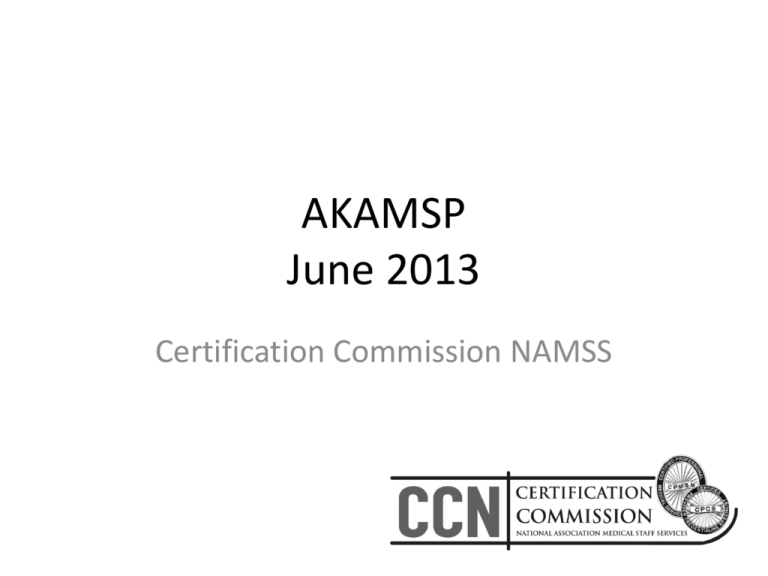
AKAMSP June 2013 Certification Commission NAMSS CCN Members • Julie A. Hatley, BS, CPMSM, CPCS – Chair • Heidi M. Thompson, BSHA, CPMSM, CPCS – Vice Chair and Chair, Test Development • Stewart Hamilton, MB, ChB, MSc, MS, CDE, CPE, FACE, FRCP • Jason A. Burden, CPCS, CPMSM • Michelle Butler, CPCS, CPMSM, MS, RHIA • Ropizah Ervin, CPCS, CPMSM • Elizabeth B. Glover, CPMSM, CPCS • June T. Hogg, CPMSM, CPCS • Kathy James, CPCS, CPMSM, RHIT • Rachelle Silva, BS, CPMSM, CPCS, Immediate Past Chair A word, or two, about NCCA: • • • • • • National Commission for Certifying Agencies Accreditation of the certification exams Credibility of the certifications Industry recognition Benchmark Declaration of competence Disclaimer • The CCN serves as an autonomous certifying arm of NAMSS and is solely responsible for the voluntary certification program • CCN does not sponsor, promote or endorse any educational product, publication or preparation courses or materials. • This presentation will not provide information regarding specific exam content or items. • This presentation does not provide any information not otherwise publicly available to all candidates. Where do I start? • • • • • • Candidate Handbook Candidate Handbook Candidate Handbook Candidate Handbook Candidate Handbook Candidate Handbook CPCS or CPMSM? • • • • CPCS Conduct, participate in and maintaining credentialing & privileging Conducting, participating in and maintaining primary source verification Compliance with accreditation and regulatory standards Supporting departmental operations CPMSM • Manage and Maintain Credentialing and Privileging Processes • Ensure Compliance with Accreditation Standards and Regulatory Requirements • Manage Departmental Operations and Facilitate Medical Staff Functions CPCS • 150 Questions • Three hours CPMSM • 175 Questions • Four hours Resources for Candidates • • • • • • • • • • • Practice Exams Prep Courses Study Groups Mentors, colleagues, other certificants Accreditation/Regulatory Standards Social Media Study Guides Industry References Flash Card Apps CCN Informational Webinar (FREE!) CCN FAQs What standards are on the exam? • AAAHC • CMS Conditions of Participation and Interpretive Guidelines for Hospitals (App. A) • HFAP • The Joint Commission Accreditation Standards • NCQA Health Plan Standards and Guidelines • NCQA CVO Standards • URAC Exams are written to the accreditation standards in effect at the time the exam is assembled (April of each year). The exam forms assembled in April are administered in the following Fall testing window and subsequent Spring and Summer testing windows. (For example exams assembled in April 2011 were administered in the Fall 2011, Spring and Summer, 2012 testing windows.) Test Development • • • • • • Job Task Analysis Item Writing Test Assembly Cut Score Administration Evaluation Job Task Analysis • Defines the “Performance Domains” • Domains – tasks, knowledge, skills • Job Responsibilities Ranked – Importance – Criticality – Frequency • Results are translated to percentage of items • CPMSM 2011 • CPCS 2013 Item Writing • • • • A reference source for every item One correct answer Plausible, but incorrect distracters Reviewed by at least three subject matter experts • Classified by content • Within the scope/blueprint Test Assembly • Appropriate number of items from each domain • Balance among the standards • Duplicates • Review performance data of items • Current Cut Score • Each candidate taking the exam is judged against a predetermined standard rather than against other candidates. The predetermined standard (or “cut score”) is set by a committee of subject matter experts working with testing experts to evaluate each question based on its level of difficulty. Once each question has been evaluated, the testing experts compile statistical data into a formula that determines the minimum passing score for each exam form. The passing score may vary among exam forms depending on the difficulty of the items which comprise each exam form. The methods used to determine the cut score adhere to NCCA certification standards. The CCN and testing experts work very hard to ensure that exams are similar in overall difficulty, however, each exam form is not identically difficult, therefore, each exam has its own unique passing score based on the standard setting for that exam form. Traditional Exam Scoring Exam Form A • 100 questions • 33 easy questions • 33 moderately challenging questions • 34 challenging questions Exam Form B • 100 questions • 25 easy questions • 34 moderately challenging questions • 41 challenging questions Passing Score 70% Passing Score 70% Exam Results and Scoring • • • • Cut Score Auto Scoring Official Results Scaled Scoring (New) Administration & Evaluation • Exit survey • The “Well-Prepared Candidate is most likely to pass the certification exam.” • Psychometric Analysis Recertification • Every 3 years • Second Certification • Continuing Education – 30 Single (15 NAMSS) – 45 Dual (25 NAMSS) • Extensions – – – – – – Maximum of 6 months Once per cycle Twice over lifetime of certification Half of required credits earned Late fee and requested by December 1st Triggers automatic audit for current and next cycle Key Policies and Important Changes • • • • • Current contact information Notifications are a courtesy Deadlines are firm Eligibility criteria applied consistently “…..at the discretion of the CCN.” Exam Appeals • Test Results • Recertification • Eligibility Ethics • To protect the value and reputation of certification – Falsification of certification status – Professional misconduct – Misrepresentation of qualifications to sit for examination – Misuse of CCN copyrighted materials – Exam Security (Candidate Handbook Page 9)
